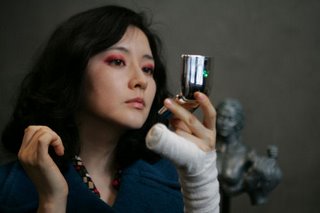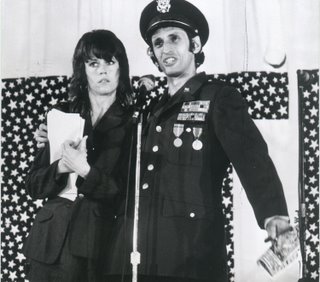
April is traditionally a movie dumping ground, a clearing-of-the-decks before Hollywood's big guns (and more audience-friendly indies) move in for summer. And so it is this summer, with a rare and welcome twist: Some of the films are quite good, and at least two are contenders for year-end honors, so don't count these remainders out.
The dynamic duo, Cristi Piui's THE DEATH OF MR. LAZARESCU and the overdue U.S. premiere of Jean-Pierre Melville's ARMY OF SHADOWS (1969, Rialto Pictures) have opened at New York's Film Forum. In the interest of full disclosure, I should say upfront that I took second prize at the trivia contest held at last Sunday's memmbers brunch (a Criterion DVD box set of Francois Truffaut's Antoine Doniel pictures was my catch), but even without this little boost it goes without saying that Film Forum is unbeatable for providing outstanding cinema in difficult times for foreign film distribution, whether the title is new or, in the case of the Melville, as old as my younger sister. After the usual not-bad but somehow ceasless winter, the local climate has improved significantly, but if you find yourself with several hours to spend--maybe after an enriching visit to the Brooklyn Botanic Garden, where the cherry blossoms, lilacs, and tulips and are in full and glorious bloom--a double feature is well-advised.
ARMY OF SHADOWS filled in a significant gap in my education on this fascinating filmmaker, not that there aren't any number of holes left to fill--almost all his early work is unavailable in this country, and Rialto, which last retrieved his LE CERCLE ROUGE (1970) from cinema's lost and found, is to be commended for this latest rescue. I reviewed the Criterion DVD of his famed LE SAMOURAI for the summer issue of Cineaste and referenced CERCLE and his last, rather woebegone effort, 1972's UN FLIC, but ARMY was very much a missing link--not one I was all that thrilled about rediscovering. Perhaps it had some sort of influence (bad) on the more casual plotting and careless craftsmanship of those two latter movies, which broaden the ice-cool aesthetic of LE SAMOURAI into almost comic-bookish extremes?
But, no; just the opposite--if SAMOURAI is cool, than ARMY, based on a novel of the early, loosely organized days of the French Resistance by Joseph Kessel (BELLE DU JOUR) and threaded with Melville's own reminscences of that dangerous period, is cold. And bleak. Stark in color and morality. It's 145 minutes at subzero temperature, with plenty of "action" material--hairbreadth escapes, clandestine plane and submarine meetings, etc.--but little catharsis. Its protagonists, negotiating a perilous situation, do so with ruthlesss dispatch, and with great consequence for their own number. I was entirely absorbed in their arabesques and charades, which reveal themselves with great skill and, at the very close, shock. The bulldog-built Lino Ventura and the great Simone Signoret, as a woman of many faces (and one soft spot) star; the Film Forum website won't let me upload a photo, but all I can say is, actors--they had faces then.

Released by Tartan Films, and pictured at right, the witty, patiently detailed, scrupulously observant and extraordinarily dense THE DEATH OF MR. LAZARESCU tops out a little longer in length, at 154 minutes, but again there is no waste. [It is, however, made in a woozier, handheld style, fitting for its subject but perhaps a bit wearing on the eye.] An extreme black comedy, the film charts the slow decline of the title character, a 62-year-old alcoholic, hastened as much by institutional neglect as whatever is ailing him. Lazarescu, whose last earthly companions are his cats, finds a single ally in his quest for adequate health care in a determined female paramedic, who accompanies him from hospital to hospital. It's a devastating indictment of a system that is itself in a state of chronic disrepair, in Romania and maybe right down the road from your living room. Ion Fiscuteanu and an actress with the lovely (and appropriate) name of Luminita Gheorghui star, as the crusty Lazarescu and his helper.

Beyond Film Forum (and its heavenly popcorn, which I often buy on the way out of the theater) there are two new worthwhile documentaries. Jane Fonda finds better use for her time than last year's MONSTER IN LAW by recounting some of her Vietnam War stories in David Zeiger's documentary SIR! NO SIR! (Displaced Films/Balcony Releasing), which opened at New York City's IFC Center on April 19. Looking ravishing, and unbowed since taking more heat for her wartime activities upon the recent publication of her autobiography, Fonda discusses her and KLUTE co-star Donald Sutherland's 1970 "tour of duty" with the FTA Show, the anti-Bob Hope revue that toured near military bases during the conflict, presenting alternative skits and music to make Uncle Sam blush (FTA stood for "F*** the Army"). "Here was a way that I could combine my profession, my acting, with my desire to end the war," says Fonda (pictured, with Michael Alaimo). "It just seemed like a perfect fit."
Fonda fits right into SIR! NO SIR! but never dominates the material, which centers on the front lines of veterans who turned against the war in the 1960s. It was not isolated resistance: Between 1966-1971, almost 504,000 "incidents of desertion" had been tabulated, numerous officers had been "fragged," and a number of units simply refused to fight in an unpopular engagement completely sullied by the infamous My Lai massacre of 1968. Soldiers published 200 underground newspapers in protest, demonstrated against the war at every major base, including encampments in Vietnam itself, and went to jail for their opposition. But, as war drags on in Iraq, much of this has faded ftom view.
SIR! NO SIR! returns to the public record some of the men who fought this battle, whose number includes Zeiger himself, an antiwar activist who was dismayed to see history rewritten "under the myth of loyal veterans returning home to an antiwar movement that spat on them and called them baby killers. The irony of that charge never fails to strike me, since whenever atrocities are exposed that are a direct outgrowth of U.S> government policy--from My Lai to Abu Ghraib--it is the government, not those opposed to these wars, that lays the blame on the soldiers who carried out their orders." Zieger's short, to-the-point film gives the soldiers an opportunity to reclaim the public record.
A more "artful" piece, Rebecca Dreyfus' STOLEN (Precision Films) recounts an infamous case of art thievery, from the Isabella Stewart Gardner Museum in Boston in 1990. Thirteen priceless works, including Vermeer's "The Concert," were boosted. They are still missing, despite the indefatigable sleuthing of one Harold Smith--who, encumbered though he is by advanced age and the ravages of skin cancer, pursues every loopy lead, to the occasional exasperation of his gumshoe son, who wishes dad wouldn't phone him at 3am with another "aha!" moment. Smith's appointments with the Irish underworld and other shadowy figures are intercut with colorful art history lectures that touch on the way art touches us and readings from the journals kept by Gardner (voiced by Blythe Danner) and her advisor, Bernard Berenson (Campbell Scott); the lady was not above a little larceny herself in building her formidable collection. Gardner's museum is the only one in the world completely planned and executed by a woman, and I would like to see it someday, perhaps with the missing spaces filled in once more with the recovered art.
LADY VENGEANCE (Tartan Films, pictured at top) is the other film I wrote about for the summer Cineaste. The final and I think the best of Korean director Park Chanwook's "revenge trilogy," it taps into the same vein of black comedy that its predecessors SYMPATHY FOR MR. VENGEANCE (weakened by a shaggy dog ending) and OLDBOY (which I absolutely despised) do, but beyond the surface flash comes up with a richer character study. More to come in the pages of the magazine.
Nicole Holofcener's FRIENDS WITH MONEY (Sony Pictures Classics) has been kicking around since early this month. I don't have much to say: as much as I liked her earlier films WALKING AND TALKING and LOVELY & AMAZING this one pretty much stays on the level of a decent off-Broadway show, a sketch rather than a portrait of passive-aggressive LA types with more money than sense. But there was one standout moment, when Jason Isaacs, playing the rather too-blunt husband of Catherine Keener (in full, tiresome brittle mode; I prefer the shadings she brings to something like THE 40-YEAR OLD VIRGIN or CAPOTE) admonishes her for between-meals snacking; "it shows on your ass," he says. At which point the mostly female audience I saw the film with exploded with rage. It was immediately clear that Isaacs was toast, which was too bad, as the other men in the film are rather on the hobbit side of appeal--but no man can get away with a fat ass comment and expect to live.


No comments:
Post a Comment